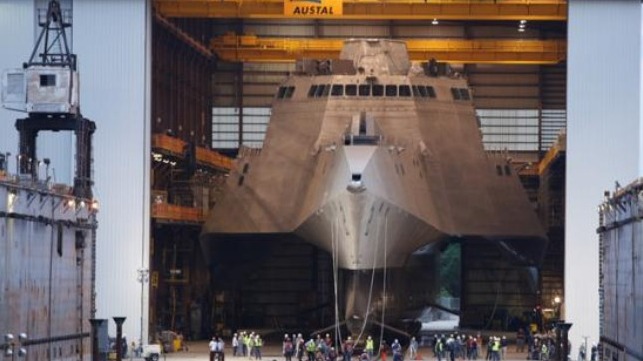Austal USA's President Resigns After Internal Investigation

In another blow for the troubled Littoral Combat Ship program, the president of Independence-class builder Austal USA has resigned amidst an ongoing federal investigation into financial and contracting irregularities at the yard prior to 2016.
"The investigations by U.S. regulatory authorities have been focussed primarily on Austal’s U.S. operations, including the write back of work in progress (WIP) attributable to the LCS program in July 2016, the procurement of certain ship components for use in connection with U.S. government contracts and charging and allocation of labor hours,” parent company Austal Ltd. said in a statement.
The "write back" refers to an increase in program costs driven by U.S. Navy shock survivability standards, and the adjustment was large enough to leave Austal with a full-year loss of $120 million in 2016. “Prior to mid-2016, inaccuracies in Austal USA’s internally generated cost estimates understated the full costs to construct the LCS vessels, which delayed Austal Ltd’s understanding of the magnitude of those costs and the need to change those estimates," Austal advised.
According to the Pentagon's director of operational test and evaluation, the Independence class was never shock-tested to Navy standards due to concerns that the vessels' non-hardened equipment - like its combat system and propulsion system - might be too fragile to survive the stress.
After shock-testing to just 50 percent of standard severity, the Navy decided to make changes to the series. "Some mission systems were removed, other equipment was modified to improve shock resistance, and construction deficiencies were corrected" in order to "further mitigate potential equipment damage and personnel injury," testified director J. Michael Gilmore in 2016.
Austal said that U.S. regulators are also looking into "the procurement of certain ship components." Some of the valves installed aboard USS Gabrielle Giffords, USS Omaha, USS Manchester, USS Tulsa, USS Charleston and USS Cincinnati were not up to Navy specifications, Austal said; however, the service has agreed to accept the ships as they were delivered and will not require equipment replacement.
An internal investigation also revealed "isolated instances of misallocation of labor hours between vessels" early in the LCS program, though the inaccuracies did not affect total labor hours billed, Austal said.

that matters most
Get the latest maritime news delivered to your inbox daily.
Austal USA President Craig Perciavalle has resigned following the completion of the internal inquiry, and he will be replaced by CFO Rusty Murdaugh on an interim basis. As for the firm, it continues to work closely with the Department of Defense, and it is investing $100 million in its yard to transition into steel shipbuilding.
Due to concerns over survivability, maintainability and lethality, the production of both LCS classes will be discontinued after hulls 31 (the future USS Cleveland) and 38 (the future USS Pierre). The canceled production will be replaced by orders for the FFG(X) frigate design, which will be built by Fincantieri Marinette Marine.
